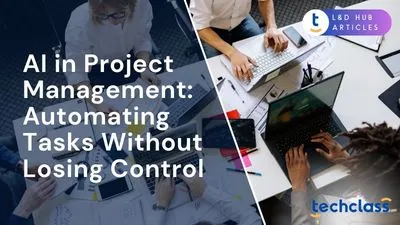Artificial intelligence is rewriting the rules of the workplace—and it’s happening far faster than anyone anticipated. This is not a distant, science-fiction scenario. It’s unfolding right now. The pressing question is: how do we prepare our teams not just to survive this shift, but to thrive in it?
The answer lies in one urgent priority—upskilling for the age of AI.
To grasp the speed of this transformation, we need to understand the concept of the half-life of a skill—the time it takes for a skill’s value to drop by half.
This means that knowledge mastered only a few years ago may already be outdated. Leaders must ask themselves a critical, if uncomfortable, question: which skills in our teams are on the verge of expiring?
This is no longer just an HR concern. It has become a core strategic challenge for every business.
We are in the midst of what can be called a full-blown AI skill quake. Upskilling is no longer a perk—it is a strategic imperative.
Consider this paradox:
This gap carries real consequences: stalled AI projects, competitors surging ahead, and security vulnerabilities from untrained teams.
To navigate this disruption, organizations must adopt a two-pronged approach:
AI literacy and digital fluency are no longer reserved for IT specialists. Every role now requires a baseline understanding of:
AI literacy, in particular, forms the foundation. Employees do not need to be programmers, but they must understand AI’s capabilities, limitations, and how to interact with it effectively. Even crafting strong prompts for tools like ChatGPT is now a core skill.
As AI takes over repetitive tasks, human skills become more valuable:
The World Economic Forum projects that by 2025, analytical thinking will be the most in-demand skill. These capabilities, rooted in human judgment and empathy, cannot be replaced by algorithms.
Skill-building alone is not enough. Without the right culture, even the best training fails to stick. The key lies in fostering adaptability—a growth mindset where learning is continuous, failure is reframed as learning, and change is embraced.
Adaptability combines three essential traits:
This meta-skill unlocks all others and serves as the foundation for a future-proof workforce.
Leaders can take immediate action with a simple, four-step framework:
Managers, in particular, must evolve from taskmasters into facilitators of growth. Culture begins at the top, and leadership signals set the tone for the entire organization.
Ultimately, success depends on culture. To thrive in the AI era, workplaces must create environments where experimentation is encouraged, failure is safe, and learning is constant.
The real question for leaders is this: Are you building a culture where your workforce can adapt, experiment, and grow? Because only in such an environment can a truly future-proof workforce emerge.


